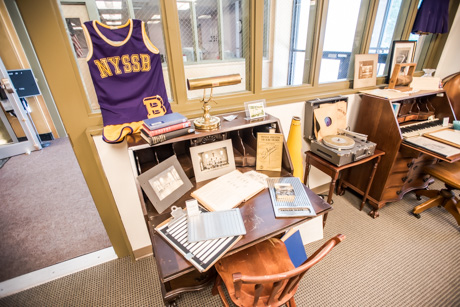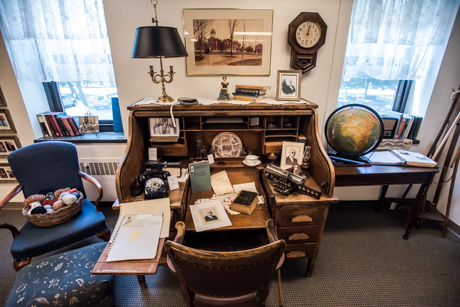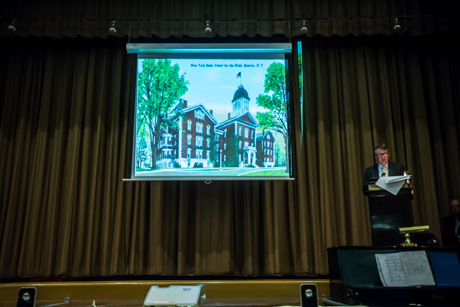
One hundred and fifty years of history, tradition, successes, and memories were shared today at the New York State School for the Blind in a ceremony marking the institution's sesquicentennial.
Today's speakers included Thomas Ruller, NYS archivist, on stage in the photo above, with a picture of the original School for the Blind, dedicated in 1868 (the current building was constructed in the 1940s).
It was the 23rd such school in the nation, putting New York at the forefront of building schools for blind students, Ruller said.
"One thing I found interesting is there is a sort of lore that the school for the blind in Batavia was established largely to support and provide assistance for veterans of the Civil War," Ruller said. "In looking at the first hundred students who entered the school, there weren’t very many individuals who were veterans of the Civil War."
The first official student, he said, was Samuel Stillwell, born in 1850, and blinded by a stick in when he was 10. He was at the school for only 11 months before his family moved to Missouri, where he died the next year of tuberculous.
One of the early students, the 13th, in fact, who went on to great success, was a native of Genesee County. Ambrose Shockwell was valedictorian of the Class of 1873. He then rejoined his family, who by that point had moved to Michigan, where he became instrumental in advancing the cause of blind people. He gained a national reputation as an educator and a leader in the blind community.
Ruller shared a quote about him from 1914: "He was gentle in spirit, caution in pronouncing judgment upon any subject, a great student, an untiring worker for those who are blind. It is safe to say that no other man in this section of the country among workers for the blind demands greater respect than Ambrose M. Shockwell."
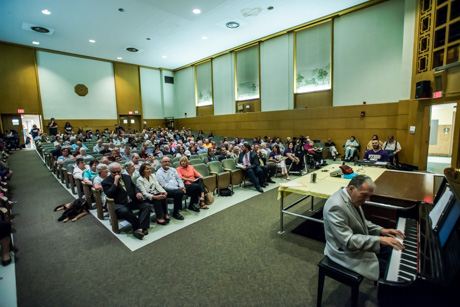
Vincent Tagliarino, Class of 1954, on piano, leading the alumni in the Alumni Alma Mater.
In his talk, Ruller noted how important music has always been to the school. For much of its history, the school's choir was sought regionally for its performances and the school had a jazz band in the 1950s and 1960s.
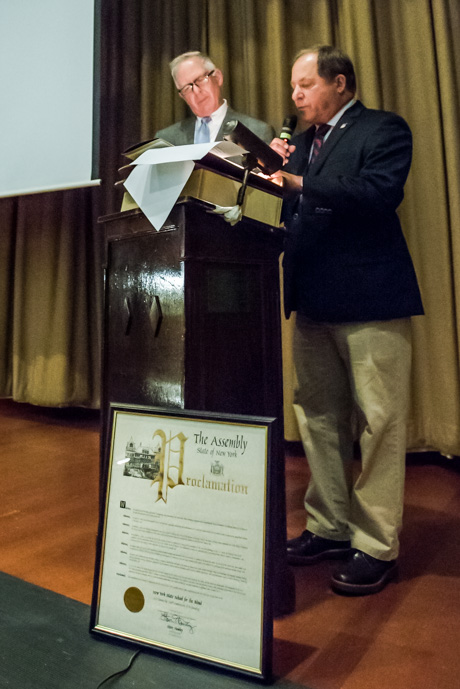
State Sen. Michael Ranzenhofer and Assemblyman Steve Hawley read a joint Senate-Assembly proclamation honoring the school.
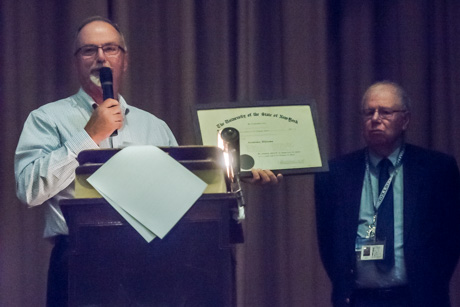
Jack Herring presented the original diploma of Agnes Hamilton, his aunt, whom everybody knew, he said, as "Aunt Agnes," as a gift to the school, returning it, he said, to where it belongs.
Hamilton graduated in 1915. She lived until she was one day shy of her 100th birthday and Herring said she was an incredible woman.
He said he learned three things from her: That "handicapped" is only a state of mind. That seeing isn't something only done with your eyes. And, that a sense of humor is an essential part of being happy.
"There is no doubt in my mind that she could see more than most sighted people and she couldn’t even distinguish daytime from nighttime," he said.
Whenever there was a family gathering or any gathering of people, Herring said, Aunt Agnes was the life of the party.
He recalled that when people learned Hamilton had a job they would ask as politely as possible what she did for a living.
"I'm a proofreader," was her deadpan response.
Pause.
“The expressions I witnessed on their faces was memorable, to say the least, but little did they know, she was actually telling them the truth," Herring said.
Hamilton worked for Reader's Digest for 40 years proofreading their Braille edition. She kept an apartment by herself in New York City five days a week and returned to her Upstate home by herself on a train each weekend.
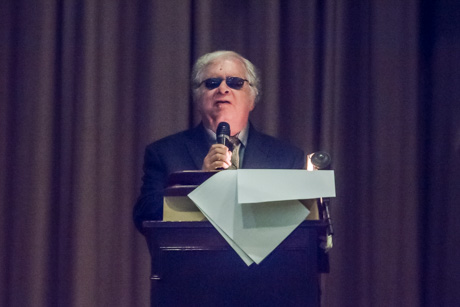
Edwin Cooney, president of the Alumni Association, shared in some detail what it was like to be a student at the NYSSB in the 1960s, recalling both the sadness at being separated from family on the first day of school and the excitement of being back with your friends, meeting new people, and doing new things. He reminisced about teachers and travels and all the things that made life living and studying at the school worthwhile.
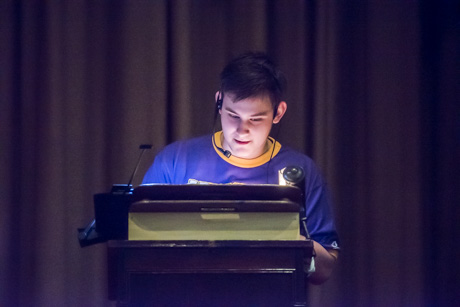
Jacob Bross is one of the school's current students. He said wasn't doing very well at his previous school. He didn't apply himself to his studies and was often late to class before dropping out.
Transferring to NYSSB changed his life, he said.
"I lacked self-confidence that I was on the same level as my peers," Bross said. "The school gave me the confidence to step outside my comfort zone."
In addition to limited vision, Bross said he was diagnosed with high functioning autism.
"The school has given me many opportunities to socialize and form friendships," he said.
He said he enjoys going to movies, local baseball games, shopping, field trips, and participating in dorm dinners, dances and proms.
"I exercise a lot of independence in completing my work," Bross said. "My teacher believes in me. She advocates for me and tells me she has faith I can pass my Regents exam. This alone helped me build my confidence. I now believe in myself."
Once he graduates, he said, he wants to pursue a career in psychology.
(A picture and information about a student who spoke was removed at the request of the school.)
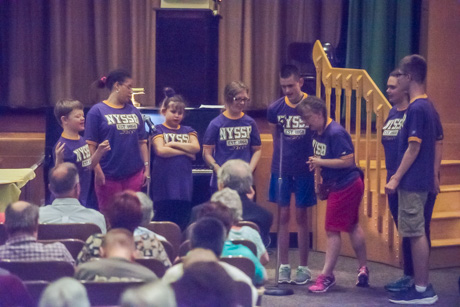
The school choir sang the Alma Mater of the current class.
Photos below, from a room off the foyer of historic artifacts.
